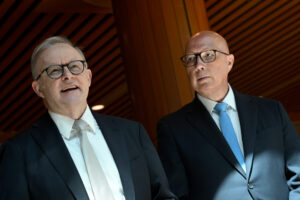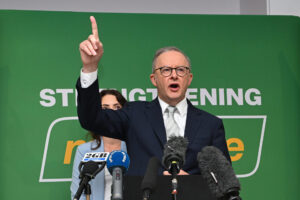It’s never too late to fix a problem. It doesn’t matter if it’s you who has been putting off a trip to the doctor or your country that has been putting off properly taxing its natural resources, it really is better late than never.

Just because the former Liberal treasurer Peter Costello failed to cash in on the resources boom of the early 2000s, and just because the mining industry succeeded in scuttling the Rudd government’s mining tax in 2009, doesn’t mean Australia should let the benefits of record commodity prices slip through our fingers yet again. Failing to do something sensible twice before is hardly a good reason to repeat the mistake a third time.
This year Norway, with a population of only 5.3 million, will collect about $137bn in tax from their oil industry. They had expected $95bn but will collect nearly 50% more than planned, mainly because of higher oil and gas prices. That’s what a good resource tax system looks like.
Meanwhile here in Australia, despite being the world’s third largest exporter of fossil fuels, people are struggling with high prices for petrol, gas and electricity (the vast majority of which is still produced from burning our own coal and gas). The idea that an energy exporter like Australia is having a tough time when the prices of our energy exports are sky high shows just how broken and detached from reality our political debate has become.
The profit share of GDP is at record highs, the wage share is at record lows, real wages are falling, and the Reserve Bank of Australia is lifting interest rates to rein in inflation caused more by profits than consumers.
And in a valiant attempt to defend the indefensible, the Business Council of Australia may have thrown the mining industry under the bus, while trying to argue that profits aren’t coming at the expense of wages.
The BCA’s chief economist Stephen Walters says that “after excluding the miners and banks, which are distorting this data and where wages are amongst the highest in the nation, the broader profit share actually has fallen”.
Just think about that. The lobby group for big business is admitting that the profits of the mining industry are so enormous they are skewing the national statistics. Could there be a stronger case for an overhaul in the way we tax these companies?
This latest claim from Walters appears to be an attempt to walk away from an earlier claim from the BCA’s chief executive Jennifer Westacott who said “once mining profits were removed, the profits share of income had actually fallen to its lowest point in 20 years”.
Thanks to the Liberals, we already have a super-profits tax on the banks, although it only took $1.6bn of the $37.6 billion profits made by the sector in 2021. And in the words of the BCA, the financial sector profited thanks partly to the “cheap money” provided by the RBA during the pandemic. So surely now is a good time to increase the windfall tax on the banks – and impose something similar on the miners.
There is no economic reason that the mining industry, and the gas industry in particular, shouldn’t share some of their gains to help Australians struggling with energy price pain. The Norwegians, by taxing their oil and gas industry, have accumulated $1.8tn in their sovereign wealth fund. But in Australia, which exports far more fossil fuels than Norway, we have just $200bn in our future fund, most of which came from the privatisation of Telstra. To put it another way, the value of our wealth fund is only a little bigger than one year’s worth of Norway’s oil tax revenue, even though Norway’s economy is a quarter of the size of ours.
It’s not just the mining and banking industries that are exploiting rising prices while pretending they can’t afford to pay employees more. Qantas, Harvey Norman and thousands of local cafes have converted higher prices for some inputs into bigger profits for themselves. But oil and gas profits have soared to astounding levels – the highest in recorded history – driven by high energy prices amid Russia’s invasion of Ukraine.
The Nobel prize-winning economist Joseph Stiglitz has argued that a windfall profits tax on energy companies is a “no brainer” and in Australia economists from Rod Simms to Chris Richardson have joined calls for such a tax on the gas industry. Whether it is used to pay down the debt the business lobby is worried about or to make childcare and medicine cheaper is beside the point. There’s no need to make the perfect the enemy of the good.
In 2013 the BCA demanded a repeal of Australia’s “unconscionably high carbon tax” and in 2019 Westacott called Labor’s 5-15% emission reduction target range “economy wrecking”. Yet in the lead up to the 2022 election, the BCA was proposing even more ambitious emissions reductions than Labor’s 43%. The fact that the BCA are today opposed to the introduction of a new tax on their biggest members is precisely irrelevant.
As with climate policy they will change their minds when the public leave them behaving again. The real question is whether Australia will take this opportunity to fix the way we tax the resource sector, or again wait for the next one.
Richard Denniss is the executive director at the public policy thinktank the Australia Institute
Related research
Between the Lines Newsletter
The biggest stories and the best analysis from the team at the Australia Institute, delivered to your inbox every fortnight.
You might also like
5 ways and 63 billion reasons to improve Australia’s tax system
With a federal election just around the corner, new analysis from The Australia Institute reveals 63 billion reasons why our next Parliament should improve the nation’s tax system.
Business groups want the government to overhaul the tax system? Excellent – we have some ideas.
The landslide win by the ALP has seen business groups come out demanding the government listen to their demands despite having provided them no support, and plenty of opposition, over the past 3 years.
10 reasons why Australia does not need company tax cuts
1/ Giving business billions of dollars in tax cuts means starving schools, hospitals and other services. Giving business billions of dollars in tax cuts means billions of dollars less for services like schools and hospitals. If Australia cut company tax from 30% to 25% this would give business about $20 billion in its first year,


